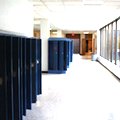- By Dan Veaner
- News
 Print
Print  Over the past three years layoffs in the Lansing schools have been a reality. While school officials have been able to minimize the impact of alarmingly reduced revenues by using reserve funds and losing positions by attrition, the gap between expenses and revenues in these years was counted in millions. Monday School Business Administrator gave one of a series of presentations to the Board Of Education that outlined the current state of the district's fund balance and how some of that money might be used to plug a $3.7 million gap in projected revenue for the 2012-2013 school budget.
Over the past three years layoffs in the Lansing schools have been a reality. While school officials have been able to minimize the impact of alarmingly reduced revenues by using reserve funds and losing positions by attrition, the gap between expenses and revenues in these years was counted in millions. Monday School Business Administrator gave one of a series of presentations to the Board Of Education that outlined the current state of the district's fund balance and how some of that money might be used to plug a $3.7 million gap in projected revenue for the 2012-2013 school budget."All we do is keep laying off staff and we have this tremendous increase with the staff that's left... we lay off more staff, and we have this tremendous increase with the staff that's left again," said school board member David Dittman. "Pretty soon we're not going to have anybody left unless we look at the problem."
The projected need for that school year is $26,762,843, but estimated revenues are only $23,055,054. In the past few years federal aid has helped plug holes in the budget caused by reduced state aid, a floundering economy, and the district's largest taxpayer's (the AES Cayuga power plant) plummeting value. In the past two years some relief was provided by federal funding, but that will almost certainly not be available going forward.
The school tax rate rose from $18.48 per $1000 of assessed property value to $19.09 last year. If that doesn't change the district will have to figure out how to adjust for a budget/revenue gap of $3,707,789.
School administrators have advocated a plan using fund balance to mitigate the tax impact of the gap, but board members are worried that they will run out of money in the face of an economy that continues to be disappointing. King outlined expenses over the last three years and revenues from New York State, the federal government, PILOTs and other sources. She presented a chart showing a breakdown of general support, instruction, transportation, and other expenses over the last three years.
Each of those years Dittman has advocated making much more severe cuts than the district has done. He argued that case again Monday, saying that the district needs a plan that will make the budget sustainable over the long haul and end the agonizing budget cuts that occur year after year.
"Even though we make these cuts our expenses are increasing at well above the inflation rate within the country," he said. "Our personnel costs are increasing at a higher rate than others in the area. We need to start to look at some of the structural issues. Not just people, but why do they cost so much and how can we change that so that this increase doesn't continue to increase the same way year after year."
v7i45



